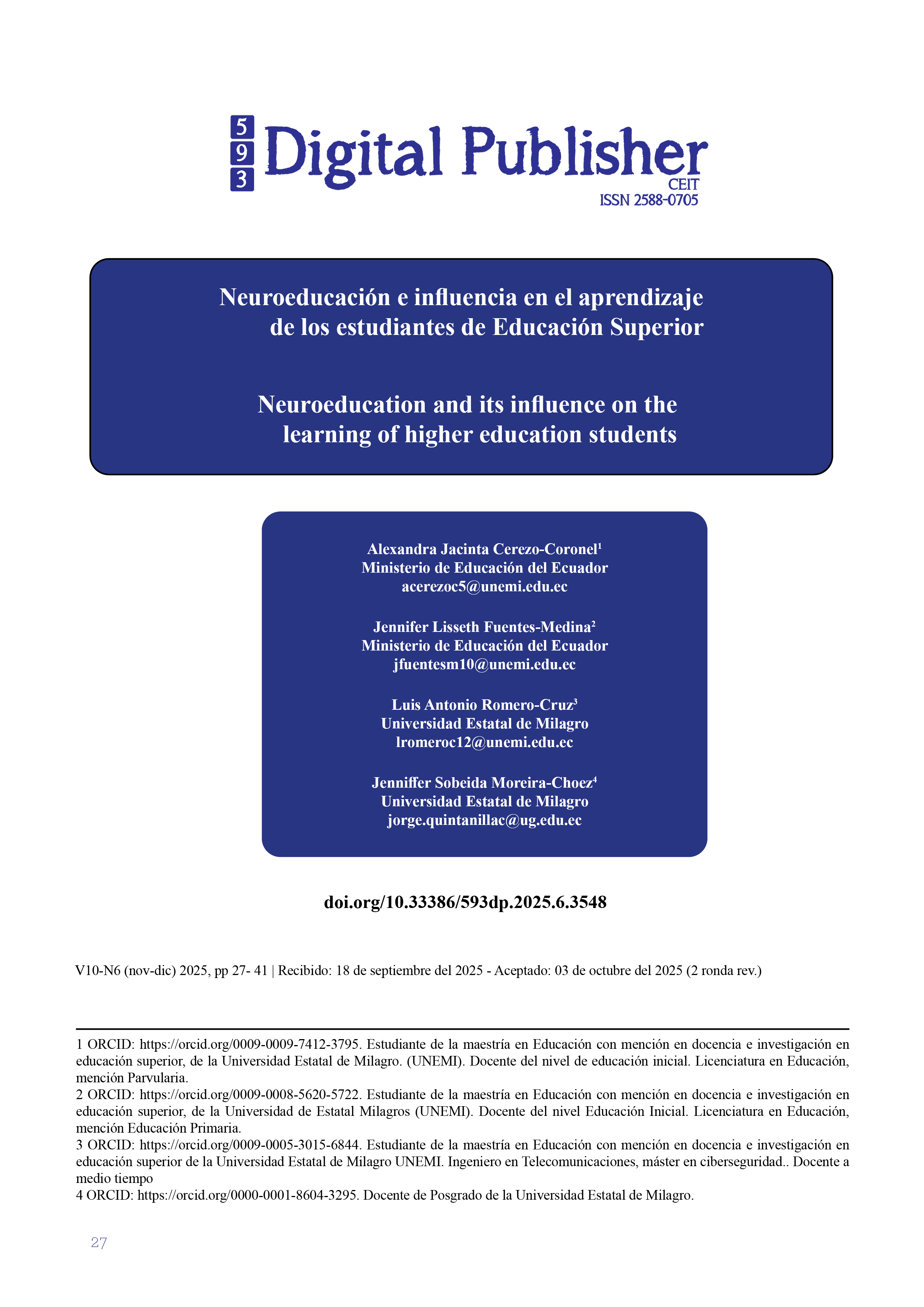Neuroeducation and its influence on the learning of higher education students
Main Article Content
Abstract
Neuroeducation has emerged as an innovative approach that integrates cognitive and emotional processes to enhance learning in higher education. In this context, the objective was to analyze the influence of neuroeducation on the learning outcomes of students enrolled in the Master’s program in Higher Education at the State University of Milagro in Ecuador. The study was conducted under a quantitative approach, explanatory type, and cross-sectional non-experimental design. The population consisted of postgraduate students, and a representative sample was selected through stratified probabilistic sampling. Data collection was carried out using a validated and reliable questionnaire, and the results were processed with SPSS statistical software version 28, applying both descriptive and inferential analyses, specifically multiple linear regression. The findings demonstrated that neuroeducation is a significant predictor of academic performance. The dimensions of attention, emotional regulation, and working memory showed positive and statistically significant effects, whereas motivation did not present significant effects. These results allowed for the acceptance of the general hypothesis and three of the specific hypotheses, confirming the relevance of the proposed model. It is concluded that academic performance is strengthened by the interaction of attention, working memory, and emotional regulation, while motivation requires further exploration in future research.
Downloads
Article Details

This work is licensed under a Creative Commons Attribution-NonCommercial-ShareAlike 4.0 International License.
1. Derechos de autor
Las obras que se publican en 593 Digital Publisher CEIT están sujetas a los siguientes términos:
1.1. 593 Digital Publisher CEIT, conserva los derechos patrimoniales (copyright) de las obras publicadas, favorece y permite la reutilización de las mismas bajo la licencia Licencia Creative Commons 4.0 de Reconocimiento-NoComercial-CompartirIgual 4.0, por lo cual se pueden copiar, usar, difundir, transmitir y exponer públicamente, siempre que:
1.1.a. Se cite la autoría y fuente original de su publicación (revista, editorial, URL).
1.1.b. No se usen para fines comerciales u onerosos.
1.1.c. Se mencione la existencia y especificaciones de esta licencia de uso.
References
Anderson, S. J., Hecker, K. G., Krigolson, O. E., & Jamniczky, H. A. (2018). A Reinforcement-Based Learning Paradigm Increases Anatomical Learning and Retention—A Neuroeducation Study. Frontiers in Human Neuroscience, 12. https://doi.org/10.3389/fnhum.2018.00038
Ansari, D., De Smedt, B., & Grabner, R. H. (2012). Neuroeducation – A Critical Overview of An Emerging Field. Neuroethics, 5(2), 105–117. https://doi.org/10.1007/s12152-011-9119-3
Bleiklie, I. (2005). Organizing higher education in a knowledge society. Higher Education, 49(1–2), 31–59. https://doi.org/10.1007/s10734-004-2913-7
Caicedo de Ortega, E., & Jiménez Cortés, R. (2021). Formación universitaria basada en la neuroeducación y la psicología positiva: percepciones de jóvenes con y sin TDAH. MLS Educational Research, 5(1). https://doi.org/10.29314/mlser.v5i1.405
Campoverde, W. G., & Álvarez, M. B. C. (2021). Neuroeducación, una disciplina inaplazable en la superación docente universitaria. Opuntio Bravo, 13.
Catrambone, Á. R., Cervino, N. G., Frisina, F., Salamó, N., & Cervino, C. O. (2025). Integrating Neuroscience and Pedagogical Practices to enhance University Learning. Journal of Neuroeducation, 6(1). https://doi.org/10.1344/joned.v6i1.48561
Cervino, C. O. (2025). Integrating Neuroscience and Pedagogical Practices to enhance University Learning. Journal of Neuroeducation, 6(1). https://doi.org/10.1344/joned.v6i1.48561
Chávez Solís, M. E., Labrada Martínez, E., Alatristre Martínez, Y., Álvarez Martínez, R. E., & Carbajal Degante, E. (2023). La Inteligencia Artificial, neuroeducación y su aportación en la transformación del e-learning. LATAM Revista Latinoamericana de Ciencias Sociales y Humanidades, 4(2). https://doi.org/10.56712/latam.v4i2.844
Cummings, S., Regeer, B., de Haan, L., Zweekhorst, M., & Bunders, J. (2018). Critical discourse analysis of perspectives on knowledge and the knowledge society within the Sustainable Development Goals. Development Policy Review, 36(6), 727–742. https://doi.org/10.1111/dpr.12296
Doukakis, S., Niari, M., Malliou, E., Vlachou, S., & Filippakopoulou, E. (2022). Teaching Informatics to Adults of Vocational Schools during the Pandemic: Students’ Views and the Role of Neuroeducation. Information, 13(6), 274. https://doi.org/10.3390/info13060274
Feng, Z., & Xiao, H. (2024). The impact of students’ lack of learning motivation and teachers’ teaching methods on innovation resistance in the context of big data. Learning and Motivation, 87, 102020. https://doi.org/10.1016/j.lmot.2024.102020
Fragkaki, M., Mystakidis, S., & Dimitropoulos, K. (2022). Higher Education Faculty Perceptions and Needs on Neuroeducation in Teaching and Learning. Education Sciences, 12(10), 707. https://doi.org/10.3390/educsci12100707
García Carrasco, J., Hernández Serrano, M. J., & Martín García, A. V. (2015). Plasticity as a framing concept enabling transdisciplinary understanding and research in neuroscience and education. Learning, Media and Technology, 40(2), 152–167. https://doi.org/10.1080/17439884.2014.908907
Gerdes, L., Tegeler, C. H., & Lee, S. W. (2015). A groundwork for allostatic neuro-education. Frontiers in Psychology, 6. https://doi.org/10.3389/fpsyg.2015.01224
Gkintoni, E., Meintani, P. M., & Dimakos, I. (2021). Neurocognitive and emotional parameters in learning and educational process. Actas ICERI2021, 2588–2599. https://doi.org/10.21125/iceri.2021.0659
Goldberg, H. (2022). Growing Brains, Nurturing Minds—Neuroscience as an Educational Tool to Support Students’ Development as Life-Long Learners. Brain Sciences, 12(12), 1622. https://doi.org/10.3390/brainsci12121622
Granado De la Cruz, E., Gago-Valiente, F. J., Gavín-Chocano, Ó., & Pérez-Navío, E. (2025). Education, Neuroscience, and Technology: A Review of Applied Models. Information, 16(8), 664. https://doi.org/10.3390/info16080664
Guerrero, J. A. A., Moreira, J. A. M., Zambrano, M. J. Z., Rivas, F. E. C., & Pilligua, M. L. B. (2021). Applied neuroscience in early childhood and high school education. International Journal of Social Sciences and Humanities, 5(3), 223–231. https://doi.org/10.53730/ijssh.v5n3.2027
Isohätälä, J., Näykki, P., & Järvelä, S. (2020). Cognitive and Socio-Emotional Interaction in Collaborative Learning: Exploring Fluctuations in Students’ Participation. Scandinavian Journal of Educational Research, 64(6), 831–851. https://doi.org/10.1080/00313831.2019.1623310
JohnBull, R. M., & Hardiman, M. M. (2024). Exploring Changes in Teacher Self-Efficacy Through Neuroeducation Professional Development. The Teacher Educator, 59(2), 175–195. https://doi.org/10.1080/08878730.2023.2214555
Jolles, J., & Jolles, D. D. (2021). On Neuroeducation: Why and How to Improve Neuroscientific Literacy in Educational Professionals. Frontiers in Psychology, 12. https://doi.org/10.3389/fpsyg.2021.752151
Lamus de Rodríguez, T. M., Arias-Iturralde, M. C., Vega-Intriago, J. O., Mendoza-Fernández, V. M., Zambrano-Acosta, J. M., Cardenas-Hinojosa, R. D., & Moreira-Choez, J. S. (2024). The HERVAT Method as a Neurolearning Strategy in Education. Academic Journal of Interdisciplinary Studies, 13(2), 255. https://doi.org/10.36941/ajis-2024-0047
Le Cunff, A.-L., Wood, H. C., Kis-Herczegh, P., & Dommett, E. J. (2024). Research Priorities in Neuroeducation: Exploring the Views of Early Career Neuroscientists and Educators. Education Sciences, 14(10), 1117. https://doi.org/10.3390/educsci14101117
Ledoux, J. E. (1989). Cognitive-Emotional Interactions in the Brain. Cognition and Emotion, 3(4), 267–289. https://doi.org/10.1080/02699938908412709
Li, L., Gow, A. D. I., & Zhou, J. (2020). The Role of Positive Emotions in Education: A Neuroscience Perspective. Mind, Brain, and Education, 14(3), 220–234. https://doi.org/10.1111/mbe.12244
Mármol Castillo, M. C., Conde Lorenzo, E., Cueva Estrada, J. M., & Sumba Nacipucha, N. A. (2022). Desarrollo de habilidades investigativas en estudiantes de Educación Superior a través de neuroeducación. Praxis Pedagógica, 22(32). https://doi.org/10.26620/uniminuto.praxis.22.32.2022.141-174
McCowan, T. (2017). Higher education, unbundling, and the end of the university as we know it. Oxford Review of Education, 43(6), 733–748. https://doi.org/10.1080/03054985.2017.1343712
Mora, Y., Arteaga, J., Ortiz Lozada, E., Rojas Romero, L. del P., & Carvajal Valencia, P. F. (2024). Neuroeducation in the learning process: Considerations from the global south. Penrose: International Journal of Interdisciplinary Studies, 1(2), e24002. https://doi.org/10.62910/penrose24002
Palma-Menéndez, S. P., Rizzo-Andrade, M. O., Vera-Rivera, M. A., & Palacios-Alonzo, S. M. (2025). Estrategias en neuroeducación y aprendizaje basado en la emoción para la motivación en el aula [Strategies in neuroeducation and emotion-based learning for motivation in the classroom]. Revista Multidisciplinaria Perspectivas Investigativas, 5(1), 18–24. https://doi.org/10.62574/rmpi.v5i1.282
Paricahua-Peralta, J. N., Mora-Estrada, O., Isuiza-Perez, D. D., Lazo-Herrera, T. A., & Atahuaman-Estrella, S. M. (2023). Neuroeducación en la práctica educativa y satisfacción en los estudiantes de una Universidad Pública Peruana. Universidad Y Sociedad, 15(4), 413–420. https://rus.ucf.edu.cu/index.php/rus/article/view/3994?utm_source=chatgpt.com
Passolunghi, M. C., Cargnelutti, E., & Pellizzoni, S. (2019). The relation between cognitive and emotional factors and arithmetic problem-solving. Educational Studies in Mathematics, 100(3), 271–290. https://doi.org/10.1007/s10649-018-9863-y
Pathak, V., & Lal Verma, K. (2024). Emergence of Confidence with Principles of Curiosity and Information Processing. Journal of Neuroeducation, 5(1). https://doi.org/10.1344/joned.v5i1.46734
Pliego-Pastrana, P., Rondero-Guerrero, C., Tetlalmatzi-Montiel, M., & Castillo-Gálvez, A. M. (2022). Articulación de saberes matemáticos en el álgebra: Transición de lo concreto a lo abstracto. Pädi Boletín Científico de Ciencias Básicas e Ingenierías Del ICBI, 10(Especial). https://doi.org/10.29057/icbi.v10iespecial.8324
Poma, B., & Castillo, D. (2022). Formación Docente, Neuroeducación y Enseñanza-Aprendizaje de la Matemática. In Metodologías de enseñanza-aprendizaje para entornos virtuales (pp. 43–53). Adaya Press. https://doi.org/10.58909/ad22820579
Pradeep, K., Sulur Anbalagan, R., Thangavelu, A. P., Aswathy, S., Jisha, V. G., & Vaisakhi, V. S. (2024). Neuroeducation: understanding neural dynamics in learning and teaching. Frontiers in Education, 9. https://doi.org/10.3389/feduc.2024.1437418
Pretorius, L. (2025). An active learning intervention for in-service teachers: self-determination theory, heutagogy, neuroeducation and the (altered) flipped classroom in practice. Curriculum Perspectives, 45(2), 91–104. https://doi.org/10.1007/s41297-024-00299-y
Ramírez Hurtado, F. M. (2021). Las emociones positivas en torno al aprendizaje significativo en Posgrado. Educación Superior, 8(2). https://doi.org/10.53287/frao7148cq79d
Ruiz Mejías, M., Pérez, N., & Carrió-Llach, M. (2021). Knowledge of neuroscience boosts motivation and awareness of learning strategies in science vocational education students. Journal of Neuroeducation, 1(2), 22–36. https://doi.org/10.1344/joned.v1i2.33035
Sánchez Almanza, L. (2023). Neuroeducación y videojuegos en la educación superior. Mérito - Revista de Educación, 5(14). https://doi.org/10.33996/merito.v5i14.1121
Solórzano Álava, W. L., Rodríguez, A., García Rodríguez, R., & Mar Cornelio, O. (2024). La neuroeducación en la formación docente. Revista Científica de Innovación Educativa y Sociedad Actual “ALCON,” 4(1), 24–36. https://doi.org/10.62305/alcon.v4i1.63
Soto Ayala, M. F., Vasco, J. A., Ramos Jiménez, R. B., & Soto Ayala, M. P. (2022). La neurociencia en la Educación Superior, perspectivas en la enseñanza, comportamiento y desarrollo de la creatividad. Revista Imaginario Social, 5(1).
Thi Bich Duyen, T. (2024). The interplay between Faculty Research and development activities and effective teaching practices in Higher Education. Vinh University Journal of Science, 53(Special Issue 2), 181–188. https://doi.org/10.56824/vujs.2024.htkhgd204
Torrijos-Muelas, M., González-Víllora, S., & Bodoque-Osma, A. R. (2021). The Persistence of Neuromyths in the Educational Settings: A Systematic Review. Frontiers in Psychology, 11. https://doi.org/10.3389/fpsyg.2020.591923
Vaca Villavicencio, V. C. (2023). Neuroeducation and emotional intelligence. Evista Científica Interdisciplinaria Investigación y Saberes, 13(2), 13–24. http://revistasdigitales.utelvt.edu.ec/revista/index.php/investigacion_y_saberes/article/view/221
Wan Mohd, W. N. H., Abd Rahman, M., Mohd Rick, A. M., Mokhtar, R., & Rahmat, N. H. (2024). Motivating and Demotivating Factors in Learning: How Do they Relate to Each Other? International Journal of Academic Research in Business and Social Sciences, 14(1). https://doi.org/10.6007/IJARBSS/v14-i1/18497
Williamson, B., Pykett, J., & Kotouza, D. (2025). Learning brains: educational neuroscience, neurotechnology and neuropedagogy. Pedagogy, Culture & Society, 1–21. https://doi.org/10.1080/14681366.2025.2521458





